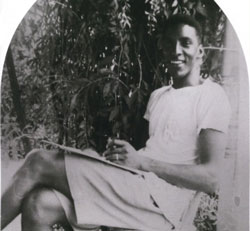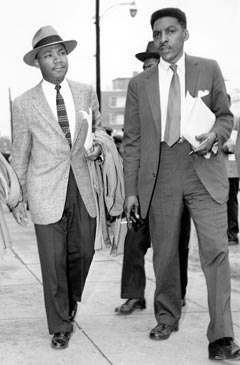Friday, November 21, 2014
Featured Panalist: Noah Gilespie
Noah Gillespie
has been involved in the WSCF since 2008 on local, national, regional,
and global levels. A former member of the Executive Committee and North
American Regional Committee, Noah currently serves on the North
American Region's Gender and Sexuality Task Group. He also represented
the North American Region at a global dialogue that brought 10 delegates
to Geneva, Switzerland to discern the Federation's role in addressing
human sexuality, gender identity, and faith as a diverse, global, and
prophetic grassroots movement. By day, Noah is an attorney in New York
City and a member of the United Church of Christ.
Thursday, November 13, 2014
Featured Film: Brother Outsider
This film will be screened for free on December 12, 2014th. You need not be registered for the conference to attend the screening. All are welcome!

A master strategist and tireless activist, Bayard Rustin is best remembered as the organizer of the 1963 March on Washington, one of the largest nonviolent protests ever held in the United States. He brought Gandhi’s protest techniques to the American civil rights movement, and helped mold Martin Luther King, Jr. into an international symbol of peace and nonviolence.
Despite these achievements, Rustin was silenced, threatened, arrested, beaten, imprisoned and fired from important leadership positions, largely because he was an openly gay man in a fiercely homophobic era. Five years in the making and the winner of numerous awards, BROTHER OUTSIDER presents a feature-length documentary portrait, focusing on Rustin’s activism for peace, racial equality, economic justice and human rights.
 Today,
the United States is still struggling with many of the issues Bayard
Rustin sought to change during his long, illustrious career. His focus
on civil and economic rights and his belief in peace, human rights and
the dignity of all people remain as relevant today as they were in the
1950s and 60s.
Today,
the United States is still struggling with many of the issues Bayard
Rustin sought to change during his long, illustrious career. His focus
on civil and economic rights and his belief in peace, human rights and
the dignity of all people remain as relevant today as they were in the
1950s and 60s.
Rustin’s biography is particularly important for lesbian and gay Americans, highlighting the major contributions of a gay man to ending official segregation in America. Rustin stands at the confluence of the great struggles for civil, legal and human rights by African-Americans and lesbian and gay Americans. In a nation still torn by racial hatred and violence, bigotry against homosexuals, and extraordinary divides between rich and poor, his eloquent voice is needed today.
In February 1956, when Bayard Rustin arrived in Montgomery to assist
with the nascent bus boycott, Martin Luther King, Jr. had not personally
embraced nonviolence. In fact, there were guns inside King’s house, and
armed guards posted at his doors. Rustin persuaded boycott leaders to
adopt complete nonviolence, teaching them Gandhian nonviolent direct
protest.
Apart from his career as an activist, Rustin the man was also fun-loving, mischievous, artistic, gifted with a fine singing voice, and known as an art collector who sometimes found museum-quality pieces in New York City trash. Historian John D’Emilio calls Rustin the “lost prophet” of the civil rights movement.

A master strategist and tireless activist, Bayard Rustin is best remembered as the organizer of the 1963 March on Washington, one of the largest nonviolent protests ever held in the United States. He brought Gandhi’s protest techniques to the American civil rights movement, and helped mold Martin Luther King, Jr. into an international symbol of peace and nonviolence.
Despite these achievements, Rustin was silenced, threatened, arrested, beaten, imprisoned and fired from important leadership positions, largely because he was an openly gay man in a fiercely homophobic era. Five years in the making and the winner of numerous awards, BROTHER OUTSIDER presents a feature-length documentary portrait, focusing on Rustin’s activism for peace, racial equality, economic justice and human rights.
 Today,
the United States is still struggling with many of the issues Bayard
Rustin sought to change during his long, illustrious career. His focus
on civil and economic rights and his belief in peace, human rights and
the dignity of all people remain as relevant today as they were in the
1950s and 60s.
Today,
the United States is still struggling with many of the issues Bayard
Rustin sought to change during his long, illustrious career. His focus
on civil and economic rights and his belief in peace, human rights and
the dignity of all people remain as relevant today as they were in the
1950s and 60s.Rustin’s biography is particularly important for lesbian and gay Americans, highlighting the major contributions of a gay man to ending official segregation in America. Rustin stands at the confluence of the great struggles for civil, legal and human rights by African-Americans and lesbian and gay Americans. In a nation still torn by racial hatred and violence, bigotry against homosexuals, and extraordinary divides between rich and poor, his eloquent voice is needed today.
 Bayard Rustin with Martin Luther King, Jr. in 1956 (Credit: Associated Press) |
Apart from his career as an activist, Rustin the man was also fun-loving, mischievous, artistic, gifted with a fine singing voice, and known as an art collector who sometimes found museum-quality pieces in New York City trash. Historian John D’Emilio calls Rustin the “lost prophet” of the civil rights movement.
Subscribe to:
Posts (Atom)


